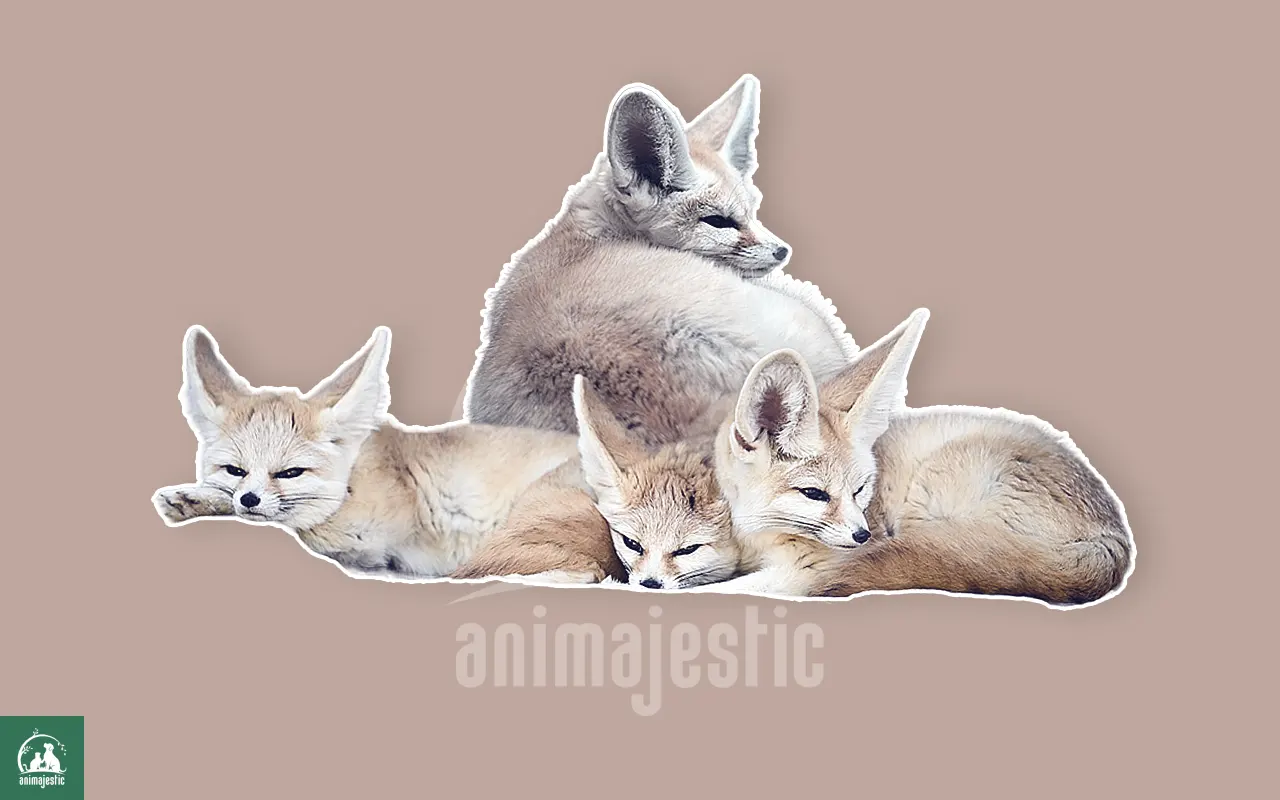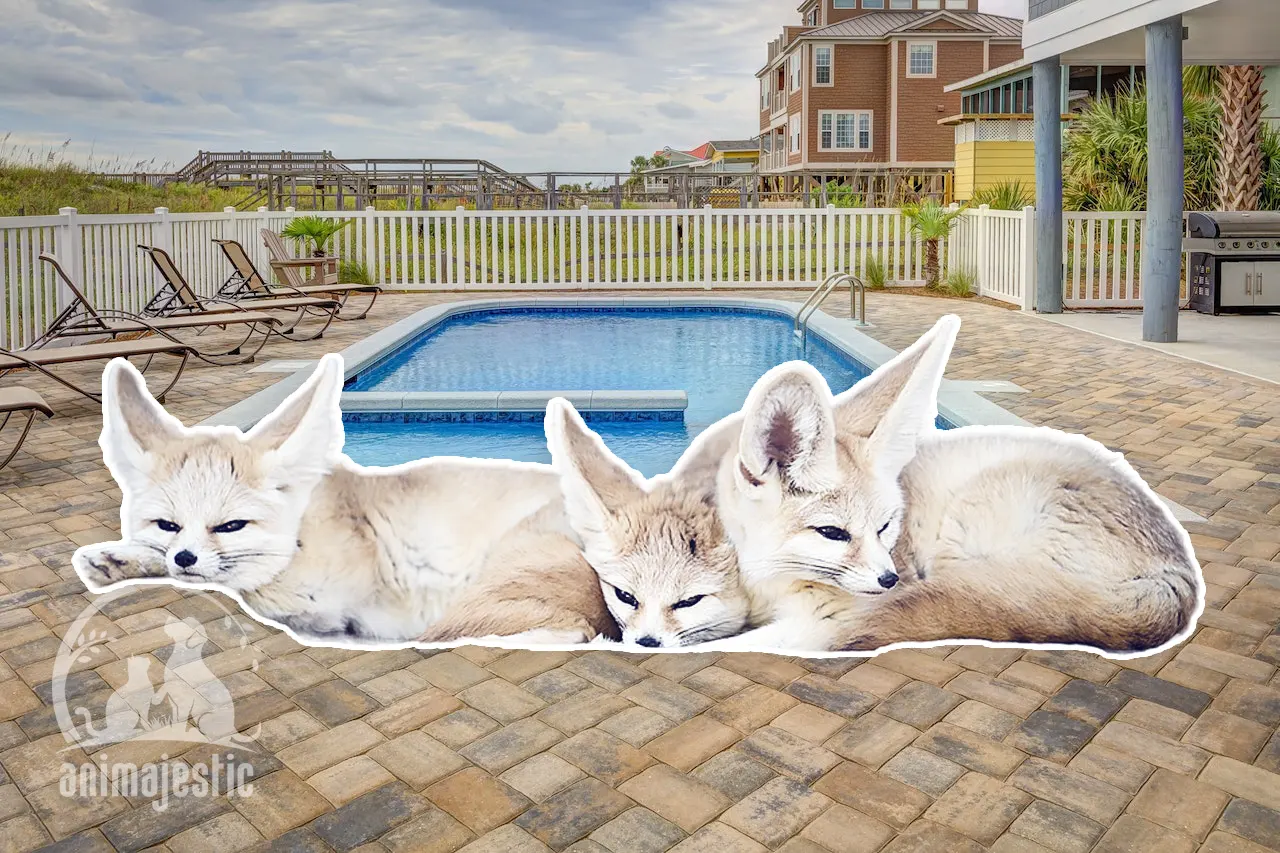People across the world continue to be enchanted by the striking and exotic appeal of the Fennec Fox. Their pixie-like features with large ears and inquisitive nature have captivated potential pet owners searching for a unique animal companion.
However, owning a Fennec Fox as a pet is not like having a dog or a cat, and it demands an entirely different level of understanding, commitment, and preparation.
I bet you have so many questions while we provide you with answers.
Fennec foxes, native to the arid deserts of North Africa, with their wide eyes, huge ears, and petite stature, have captivated people’s hearts for years. As enchanting as they are, life with a Fennec Fox as a pet is unique and complex compared to more conventional pets.
About This Specie
Family: Canidae
Specie: Vulpes zerda
Class: Mammalia
Length: 18 – 31 cm (Adult + Tail) Ear: 6 inches
Lifespan: 12 – 15 years
Weight: 2 – 3.5 pounds
Gestation: 50 days
Conservation status: Least Concern
Understanding Fennec Foxes
Anatomy and Natural Features
The Fennec Fox (Vulpes zerda) is the smallest member of the Canidae family. Adult Fennec Foxes weigh between 2 to 4 pounds and measure 9 to 16 inches in body length.
These small, nocturnal mammals are native to the Sahara Desert and other arid regions of North Africa and the Arabian Peninsula.
Their large ears, which can reach a length of 6 inches, are responsible not only for aiding them in locating prey underground but also for controlling their body temperature.
Lifespan and Reproduction
In the wild, Fennec Foxes live approximately 8 to 10 years, while domesticated Foxes can live up to 14 years. Fennec Foxes reach sexual maturity around 9 months of age and mate for life.
Female Fennec Foxes typically give birth to 1 to 5 kits (baby Fennec Foxes) in early spring following a gestation period of approximately 50 days.
Fennec Foxes’ Traits and Habits
Physical Attributes
- Size: Fennec foxes weigh between 2 – 3.5 pounds and stand around 8 inches at the shoulder, making them the smallest of all known fox species.
- Ears: Their large ears, which can grow up to half the length of their body, act as natural radiators and help them dissipate excess body heat.
- Coat: Their thick, sand-colored fur not only protects them from the harsh desert sun but also serves as insulation during colder nights.
The Reality of Owning a Fennec Fox as a Pet
Legalities and Ethical Concerns
- Legalities: Laws regulating the ownership of exotic animals, including Fennec Foxes, differ by country and even local jurisdiction.
In the United States, laws on exotic animal ownership can vary from state to state, with some requiring permits and others outright banning them.
Before considering owning a Fennec Fox, familiarize yourself with applicable laws, regulations, and permit requirements. - Ethical Concerns: Understanding the ethical implications of owning an exotic animal like a Fennec Fox is important. Always ensure that your Fennec Fox comes from a reputable breeder and not through illegal channels or from the wild.
Capturing or trading wild-born Fennec Foxes severely disrupts natural ecosystems and contributes to unethical practices, such as wildlife smuggling.
Initial Cost and Ongoing Expenses
- Acquisition: Purchasing a fennec fox typically costs between $1,500 and $3,000 from a reputable breeder. Adopting from a rescue organization is another option, although this may be less common given the rarity of these animals in shelters.
- Housing: A large, spacious enclosure, both indoors and outdoors, is necessary to accommodate a fennec fox’s activity level and prevent escapes. These enclosures often require significant investment.
- Food: Fennec foxes require a diverse diet that can include high-quality dog food, raw meat, insects, fruits, and vegetables. Monthly food expenses will vary, but it’s important to budget and plan before taking on such a responsibility.
- Veterinary Care: As exotic pets, fennec foxes may require specialized veterinary care, which can be expensive and sometimes difficult to find.
Healthcare and Lifespan
- Lifespan: Fennec foxes in captivity generally have a lifespan of 12-15 years with proper care.
- Common Health Concerns: Some potential health issues include dental problems (they’re prone to dental problems and regular dental cleanings can help prevent issues that could lead to tooth loss or gum infections), parasites, digestive issues (e.g. gastrointestinal issues), and metabolic bone diseases, often linked to inadequate diet and lack of proper nutrition. Regular check-ups and vaccinations with an exotic veterinarian are necessary to ensure your fennec fox remains in good health.
- Veterinarian Care: Identifying and establishing a relationship with an experienced exotic animal veterinarian is crucial. Regular checkups and vaccinations play an essential role in your Fennec Fox’s overall health.
Caring for Your Fennec Fox
Housing and Environment
Their housing environment is very important and can help them live longer as well.
Indoor Enclosure:
When you house your Fennec Fox indoors, provide an escape-proof enclosure with ample room to move, climb, play, hide, and rest.
A large dog crate or an adapted small animal pen can work.
Like outdoor housing, furnishing their indoor habitat with hiding spots, toys, and climbing structures will prevent boredom and encourage mental stimulation.
Also providing them with digging spaces is essential to keep these agile creatures entertained.
Outdoor Enclosure: A secure and spacious outdoor enclosure allows Fennec Foxes to experience fresh air, natural sunlight, and opportunities to explore.
The enclosure should have a minimum height of 6 feet, with wire mesh or solid walls. Due to their expert digging abilities, burying mesh or concrete below ground is necessary.
Within the enclosure, provide hiding spots, burrows, and shelter to replicate their natural habitat, and make sure to use sand or dirt as a substrate to facilitate their instinctual digging behavior.
Temperature and Lightning: Fennec Foxes, being desert animals, thrive in temperatures between 68°F to 95°F. Heating elements, such as heat lamps or ceramic heaters, may be required during colder months.
As nocturnal animals, Fennec Foxes might appreciate a sleep box with a bedding material for daytime slumber in a dark and quiet spot. Ambient lighting that mimics the natural daylight pattern is helpful for maintaining their circadian rhythm.
Nutrition and Diet
Providing a balanced diet is essential for your Fennec Fox’s health.
- Diversity: Ensure your fennec fox has a diverse diet, including high-quality dog food, vegetables, fruits, and small amounts of lean meats.
- Insects: Insects such as mealworms, crickets, and silkworms are an essential part of their natural diet and should be included regularly.
- Portion Control: Monitor the food portion sizes and avoid overfeeding to prevent obesity and other health complications.
Avoid Health Hazards
Avoid feeding cooked bones, salty foods, and high-fat items. Always introduce new foods with caution and monitor for any allergic or adverse reactions.
Consult an exotic veterinarian or nutrition expert to create the right combination of dietary items for your specific Fennec Fox.
Behavior, Socialization, and Enrichment
- Interaction (Humans & Other Animals): It’s essential to start socializing with your Fennec Fox from a young age. Although not as domesticated as dogs, Fennec Foxes can adapt to live with humans and, in some cases, other pets.
However, keep in mind that their instincts can sometimes cause them to view smaller animals, such as rodents or birds, as prey. Spend time socializing, handling, and playing with your fennec fox to build trust and strengthen the bond between you.
They form strong bonds with family members and communicate through a variety of vocalizations including barks, screeches, and purrs. - Enrichment: Provide mental and physical stimulation by offering various toys, climbing structures, and puzzles, which will help channel their energy and reduce any negative behaviors.
- Exposure: Safely expose your fennec fox to new sights, sounds, and experiences to keep them engaged and curious about their surroundings.
- Training: Harness and leash training your Fennec Fox require patience, understanding, and consistency. They typically don’t respond well to conventional training methods like those employed with dogs. Using positive reinforcement techniques, such as praise, treats, and encouragement, can yield the best results.
- Temperament: Fennec Foxes are social and energetic creatures. In their natural habitat, they live in close-knit family units, exhibiting cooperative behaviors and complex communication patterns.
- Nocturnal Nature: These animals are primarily nocturnal, preferring to sleep during the day and become active at night when temperatures are cooler.
- Adaptive Skills: Fennec foxes demonstrate remarkable adaptability, capable of adjusting to a variety of different environments and circumstances beyond their native habitat.
- Energetic & Playful Behavior: Fennec foxes possess copious amounts of energy, displayed through their lively play and boundless curiosity.
Challenges of Owning a Fennec Fox
Nocturnal Activity
Fennec Foxes are primarily active at night. Their nocturnal habits can make it challenging to accommodate their needs, as their desires for attention, play, and sustenance often conflict with human schedules.
Distinct Odors
Fennec Foxes have a distinct and sometimes strong odor. Odors emanate from scent glands and their waste, which can be off-putting to some individuals.
Finding Reliable Resources
Locating experienced Fennec Fox breeders, trainers, and veterinarians can be challenging due to the rarity of this species in the pet world. Networking with others who own Fennec Foxes or joining online communities can help you find valuable resources and support.
Making an Informed Decision
Although Fennec Foxes are incredibly alluring animals, it’s critical to consider the challenges, costs, and commitment necessary for owning such a unique pet.
Before making the life-changing decision, connect with fellow Fennec Fox enthusiasts, breeders, and veterinarians to obtain insights into the reality of living with these extraordinary creatures.
Making an informed choice ensures both you and your Fennec Fox have a more fulfilling and enjoyable experience.
Conclusion
Owning a fennec fox is not a decision to be taken lightly. They require dedication, specialized care, and an understanding of their unique needs.
Before adopting a fennec fox, ensure you have the resources, time, and commitment to provide them with the best possible life.
If these factors align and you are keen on embracing the challenge, a fennec fox’s charm, intelligence, and energy can bring joy to your life for many years to come.

